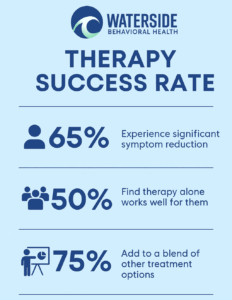When your young adult child starts unraveling, no one hands you a guidebook. What you’re facing doesn’t look like the flu or a breakup or a bad grade. It looks like something deeper. Scarier. And suddenly, parenting feels like a language you never learned.
If you’re here, you’re likely in the thick of it—and wondering if mental health therapy could actually help. You’re not alone. And there are answers.
It Doesn’t Look Like the Movies—and That’s Why It’s Hard to Name
Mental health crises in young adults rarely look like a dramatic movie scene. Sometimes, it’s a slow withdrawal—the spark fades, the routines slip, and your once-vibrant child now barely eats or speaks. Other times, it’s sudden and disorienting: an explosive rage, a panic attack, a call from campus that changes everything.
You might hear things like:
- “I can’t do this anymore.”
- “Nothing matters.”
- “I’m fine—just tired.”
It’s hard to explain the weight of watching someone you love unravel from the inside out. Especially when you’re expected to “give them space” because they’re technically an adult now.
Many parents describe it the same way: “Something was off, but I didn’t know what I was looking at.” That confusion is real—and it’s common.
What Mental Health Therapy Actually Means in Crisis
When the internet floods you with “support options,” it’s easy to get lost in a sea of clinical language. But here’s the core:
Mental health therapy is a structured, compassionate process designed to stabilize, support, and treat emotional or psychological distress. It creates a safe container when life feels chaotic—especially for young adults who don’t yet have the tools to handle what they’re feeling.
At Waterside Behavioral Health, our mental health therapy options for young adults in Plymouth County include:
- Individual Therapy: A one-on-one space to explore anxiety, depression, trauma, or identity shifts
- Group Therapy: A sense of connection for those feeling isolated or misunderstood
- Family Therapy: Support for rebuilding trust, improving communication, and learning how to help without enabling
- DBT and CBT-Based Approaches: Skill-based methods that teach emotional regulation, distress tolerance, and thought reframing
- Psychiatric Evaluation: When appropriate, medication support can be integrated safely
These aren’t “treatment plans.” They’re lifelines. And they’re tailored to where your child is—not where a textbook says they should be.
The Shift from “Fix It” to “Be With It”
As parents, we’re wired to jump in. To fix. To solve. But mental health doesn’t work like a scraped knee. You can’t offer a bandage and a snack and make it better.
One of the hardest transitions is this: You can’t fix it. But you can stand beside them.
Therapy creates space for young adults to take ownership of their healing. And often, it also helps parents shift from “manager” to “mirror”—from “rescuer” to “resource.” You’re still essential. You’re just not in charge of their outcomes anymore.
This doesn’t mean letting go. It means showing up differently.
Real Progress Looks Quiet
If you’re waiting for a Hallmark-movie breakthrough, you might miss the wins that matter most.
Here’s what actual progress looks like:
- “She asked me to reschedule her therapy session instead of canceling.”
- “He finally admitted he was scared—and didn’t want to feel like this anymore.”
- “They stopped pretending and started participating.”
These are the moments that change everything. They’re quiet, small, often invisible to the outside world. But they are the heartbeat of recovery.
And they’re not rare. We’ve seen hundreds of young adults move from collapse to clarity—step by careful step.
When to Act (Even If They Say They’re “Fine”)
You know your child. And if your gut is screaming, listen.
Here are signs that mental health therapy might be urgently needed:
- Sudden withdrawal or isolation
- Unexplained rage or apathy
- Self-harm (cutting, burning, risky behavior)
- Expressions of hopelessness or despair
- Disconnection from reality (paranoia, hallucinations, delusions)
- Not functioning day-to-day (missing school, hygiene neglect, sleeping all day)
If you’re seeing these symptoms, you don’t need a diagnosis to seek help. You need a provider who knows how to hold this kind of pain—and guide your family through it.
What We Tell Parents Who Feel Like They’re Failing
Here’s the truth that doesn’t get said enough:
You didn’t cause this. You can’t cure it. But you can be part of the healing.
There’s no perfect sentence or strategy that will make everything okay. But there is a path forward—and therapy often becomes the starting point for both your child’s healing and your own.
Many parents tell us later:
“That first call was the hardest. But it changed everything.”
Frequently Asked Questions (FAQs)
How do I know if it’s a mental health crisis—or just a tough season?
If your child is no longer functioning in ways that match their usual patterns—sleep, socializing, eating, going to class—it’s worth investigating. When fear or sadness turns into collapse, self-harm, or disconnection from reality, it’s time to seek professional help.
What if my child refuses therapy?
Resistance is common, especially when shame or fear is high. The key is not forcing therapy—but offering it as support. Many young adults are more open to therapy when it’s framed as a way to understand themselves, not “fix” what’s wrong.
Family therapy can also be a good first step, opening doors without putting them on the spot.
Can therapy help even if we don’t have a formal diagnosis yet?
Yes. You don’t need a diagnosis to begin therapy. In fact, early intervention—before things worsen—can sometimes prevent more serious mental health conditions from spiraling.
What role do parents play once therapy starts?
You’re still vital. Parents often participate in family sessions, learn communication skills, and receive guidance from clinicians on how to support without overstepping. The goal is not to be cut out—but to be brought in, in a healthier way.
Is it possible to get help locally in Plymouth County?
Yes. At Waterside Behavioral Health, we serve families throughout Plymouth County, MA, offering outpatient mental health therapy for young adults and their parents. Whether your child is stepping down from inpatient care or just starting to unravel, we’re here.
There’s Still a Way Forward
Call 774-619-7750 or learn more about our Mental Health Therapy services in Plymouth County, MA.





